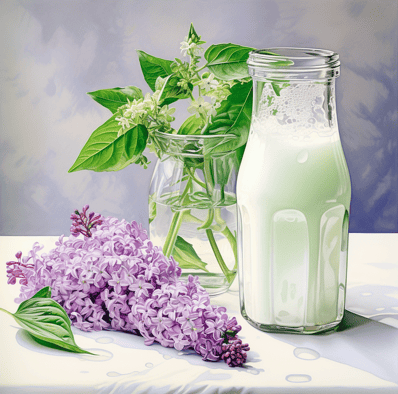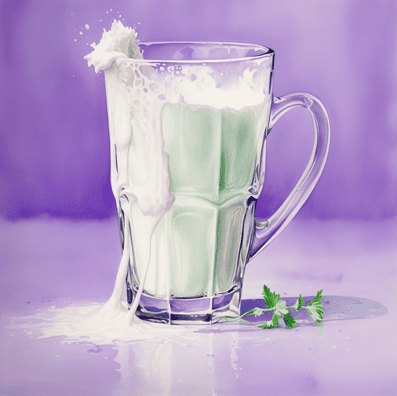
Don’t want to read the whole post?
Goat milk contains hormones and proteins like casein that might trigger acne in some people. However, its impact varies individually and depends on factors like skin type and overall diet. Consulting a healthcare professional is recommended for personalised advice.
ABOUT ME
Be beauty. Be plant-based!
As a former Registered Nurse and avid plant-muncher, I’m in love with how simple plant-based foods make it easy to be beautiful.

You’ll also love:
Is Soy Your Acne Friend or Foe?
Breakouts or Breakthroughs? Is Almond Milk Good for Acne?
Herbs for Hormonal Acne: Transform Your Skin
Does goat milk cause acne? In a world where every bite and sip impacts our skin, this question is not just a matter of curiosity but a crucial aspect of a health-conscious lifestyle on the journey to clear skin. Goat milk, often celebrated for its natural goodness and positioned as a healthier alternative to cow’s milk, might hold secrets affecting our skin’s wellness.
Acne: It’s Not Just Pimples and Blackheads!
Picture this: your skin, a peaceful neighbourhood, suddenly disrupted by uninvited guests – pimples, blackheads, and an oily sheen. Welcome to the world of acne, a skin condition that’s way too common and as unpredictable as a plot twist in a soap opera.
You’ve got your usual suspects: hormonal acne that loves to crash your party at the most inconvenient times (think big date or photo day), acne vulgaris, the most popular of the bunch with a mix of blemishes, and the tough guy, cystic acne, known for its deep, painful presence.
Now, how do these troublemakers sneak in? It starts with a pile-up of dead skin cells and sebum (skin oil), kind of like traffic congestion in your pores. Before you know it, inflammation flares up, leading to those notorious acne breakouts.

Here’s where the plot thickens: some folks start looking at their plates and glasses, especially at dairy products. Enter goat milk, the character with a mysterious edge. Known for its special blend of milk proteins and fatty acids, goat milk has everyone asking: friend or foe for your skin?
This is particularly pressing for the acne sufferers club, a group all too familiar with the quest for clear skin. As we dive into this dairy debate, we’re looking at its effects on the whole cast – from those with acne-prone skin to the ones blessed (or cursed?) with sensitive skin.
So, will goat milk make the skin scene better or worse? Stay tuned as we explore this dairy dilemma. Remember, your skin’s story might have a different plot twist!
You’ll also love:
Breakouts or Breakthroughs? Is Almond Milk Good for Acne?
Goat Milk and Acne
Does goat milk cause acne? The connection between goat’s milk and acne isn’t straightforward, but it’s believed to involve a few key factors:
Hormonal Influences in Goat Milk
Goat’s milk, like other dairy products, naturally contains hormones that can impact the body’s hormonal balance. This is particularly significant for hormonal acne, where such hormonal shifts can aggravate skin conditions. The natural hormones in goat’s milk might play a role in the development and exacerbation of acne.

Blood Sugar Levels and Dairy Proteins
The lactose content in goat’s milk, although typically lower than cow’s milk, can affect blood sugar levels. Fluctuating blood sugar can lead to increased insulin production, which in turn may increase sebum production, a key factor in acne formation. Additionally, specific milk proteins in goat’s milk, like casein and whey, contribute to this process and could potentially trigger acne in certain individuals.
Dairy Proteins
Goat’s milk has specific milk proteins such as casein and whey. These proteins can prompt the body to produce more insulin and Insulin-Like Growth Factor 1 (IGF-1). Elevated levels of these substances are associated with increased sebum production, a key factor in acne development.
Fatty Acids and Bioactive Molecules
The particular types of fatty acids and other bioactive molecules in goat’s milk might also play a role in acne development. They could contribute to inflammation or affect the activity of the skin’s sebaceous glands.

Individual Sensitivity
The effect of goat’s milk on acne varies greatly among individuals. Factors like genetic makeup, overall diet, and personal sensitivities to dairy products can influence whether goat’s milk exacerbates acne for a specific person.
Gut Health
The relationship between goat milk and the skin’s microbiome is an area of increasing interest. Goat milk contains good bacteria and probiotics, which can potentially influence the skin’s health. These anti-inflammatory properties might benefit the skin, particularly in managing conditions like acne vulgaris.
A balanced skin microbiome is crucial for maintaining healthy skin, and the probiotics in goat milk could play a supportive role. However, the direct impact of goat milk on the skin’s microbiome and its effect on various skin conditions is still a subject of ongoing research.
Goat Milk Dairy Products and Acne
Diving deeper into dairy, let’s consider goat milk yogurt and goat cheese, popular derivations of goat milk. These products contain lactic acid, a component known for its skin benefits, particularly for those with acne-prone skin and sensitive skin. Lactic acid, an alpha-hydroxy acid, can aid in gently exfoliating the skin, potentially reducing acne and improving skin texture.
However, the presence of dairy proteins and fats in these products means their impact on acne can vary. While some may find these products soothing, others might experience an exacerbation of skin issues
Lactose Intolerance and Skin Health
Lactose intolerance can also play a significant role in how goat milk affects skin health. While goat milk contains lactose, it’s often in lower amounts compared to cow’s milk and may be easier to digest for some. However, for individuals with severe lactose intolerance, consuming goat milk might still lead to digestive issues, which can indirectly affect skin problems. It’s important for those with lactose intolerance to consider lactose-free alternatives or moderate their dairy consumption, keeping in mind their overall skin health and any skin problems they might be experiencing.

Goat Milk in Skincare: Beyond Consumption
The use of goat milk extends beyond dietary consumption, particularly in skincare products. Goat milk is increasingly used in creams, lotions, and cleansers due to its moisturising properties and its potential to support a healthy skin barrier. For those with dry skin or sensitive skin, goat milk-based skincare products can be gentle and nourishing.
When it comes to the benefits of goat milk, we find a rich array of nutrients, including amino acids and alpha-hydroxy acids. These components are known for their skin-nurturing properties. The pH of goat milk closely aligns with that of human skin, suggesting a natural compatibility. This similarity could potentially support the skin barrier and promote healthy skin when used topically.
However, for individuals with acne-prone skin, it’s important to be cautious. While some may benefit from the anti-inflammatory properties of these products, others might find that dairy-based skincare exacerbates their skin problems. A patch test is recommended before fully incorporating goat milk skincare products into a routine. This approach helps ensure compatibility with one’s skin type and reduces the risk of triggering acne breakouts.
Does goat milk soap clog pores?
Goat’s milk soap, as a natural soap, is typically less likely to clog pores compared to traditional soaps that contain harsh chemicals. Its natural fat content provides moisture without leaving a heavy residue. However, like any skincare product, individual reactions can vary, and it’s essential to choose a soap that matches your skin type.
Does goat milk help with acne scars?
While goat milk has moisturising and exfoliating properties, there is limited evidence to suggest it can significantly reduce acne scars. It’s gentle exfoliation might help in the gradual fading of scars over time. For more targeted treatments, consulting with a dermatologist is recommended.

Conclusion: Does Goat Milk Cause Acne?
In concluding our exploration of does goat milk cause acne, it’s clear that this is a complex question with no one-size-fits-all answer. The relationship between goat milk and skin health is influenced by various factors, including individual dietary reactions, skin types, and specific skin conditions. While goat milk offers nutritional benefits and certain anti-inflammatory properties, its impact on acne can differ from person to person. For those with lactose intolerance or sensitive skin, it’s important to approach goat milk cautiously. Ultimately, the journey to understanding and managing acne breakouts or hormonal acne is highly personal. Consulting with healthcare professionals, like dermatologists, can provide valuable insights and guidance tailored to individual needs and concerns. Remember, maintaining a healthy diet and understanding your skin’s unique requirements are key to achieving and sustaining healthy skin.
FAQ: Does Goat Milk Cause Acne?
Is goat milk good for the face?
Goat milk can be beneficial for the face due to its moisturising properties and compatibility with the natural pH of human skin. It can act as a gentle natural exfoliant, removing dead skin cells and promoting a smooth, clear complexion. However, its suitability may vary depending on individual skin types and sensitivities.
Is goat milk good for oily skin?
Goat milk can be beneficial for oily skin due to its natural moisturising properties. It helps balance the skin’s natural oils without over-drying, which is often a risk with products designed for oily skin. Additionally, as a natural product, goat milk is generally gentler than many conventional acne treatments.
Which milk is best for acne-prone skin?
For acne-prone skin, non-dairy alternatives like almond milk and coconut milk are often recommended as they are less likely to trigger acne compared to dairy milk. Among dairy options, goat milk and sheep’s milk are generally considered more gentle than cow’s milk. Skim milk and whole milk can sometimes exacerbate acne due to their hormonal content.
Which milk products cause acne?
Acne triggers vary from person to person, but some studies suggest that certain milk products, particularly cow’s milk, whole milk, and skim milk, might exacerbate acne. This is thought to be due to hormones and bioactive molecules in milk. Soy milk has also been implicated in some cases, although this may depend on individual sensitivities. For many, goat milk, almond milk, and greek yoghurt are considered gentler alternatives. However, it’s important to monitor your own skin’s response to different milk products, as individual reactions can vary.